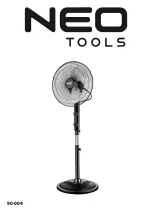
Fan Stopped Working
Main Voltage Fluctuation
Fan Safety Feature, when voltage drops below
140v or exceeds 270v for more than 5 seconds,
motor will cut off automatically. When voltage
has returned to correct levels, it will turn back
on automatically.
Fan Cutting Off/On
Temperature Cut Off
This is normal as the motor is protected by
thermal sensor where it will limit the motor
temperature from rising to no more than 750C.
Once temperature is above, fan will cut off till
temperature is reduced. This operation is to
increase the life of the motor.
Fan Light Not Working
Loose Wires
Turn fan off, open cover and check plug
connecter is connected securely.
Jerks Upon Startup
Fan Startup
This is normal operation as it is powered by a
3-phase brushless DC motor. This jerk will not
affect fan performance.
No Airflow
Fan running in reverse mode
Press S/W button to reverse fan blade direction.
Ripple Control
Electricity distributors through Australia, particularly areas of NSW and QLD use a ripple control signal on their
distribution networks to remotely control demand devices like off-peak hot water heaters, and to implement
differential tariffs.
Ripple control adds a high frequency signal on top of the standard Australian 240V AC 50Hz power supply,
and some electrical appliances can be sensitive to this high frequency signal. It is mainly devices like fans,
and dimmed lights that can potentially be affected by the ripple control signal. The result could be buzzing
noises from fans, or flickering lights at certain times of the day.
Ripple effects can be reduced by installing ripple signal filters. The filter is specifically tuned to eliminate the
ripple effect signal frequency. Areas in NSW and QLD can have varying frequency’s, it is advised to consult
with your electrical contractor and provider to source the correct device for your area.
Note: Ripple control noise is NOT covered by warranty. Service calls based on noise where a genuine
fault cannot be found by our qualified service agent, will result in you being charged the cost of the
service call.
13





































